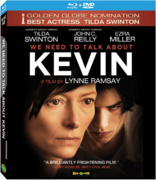We Need to Talk About Kevin Blu-ray Movie
HomeWe Need to Talk About Kevin Blu-ray Movie 
Blu-ray + DVDOscilloscope Pictures | 2011 | 112 min | Rated R | May 29, 2012
Movie rating
7.5 | / 10 |
Blu-ray rating
| Users | 4.5 | |
| Reviewer | 4.0 | |
| Overall | 4.4 |
Overview
We Need to Talk About Kevin (2011)
A smart, educated mother tries to come to terms with the aftermath of her 15-year-old son's killing spree.
Starring: Tilda Swinton, John C. Reilly, Ezra Miller, Siobhan Fallon Hogan, Alex ManetteDirector: Lynne Ramsay
| Drama | Uncertain |
| Psychological thriller | Uncertain |
| Thriller | Uncertain |
Specifications
Video
Video codec: MPEG-4 AVC
Video resolution: 1080p
Aspect ratio: 2.35:1
Original aspect ratio: 2.39:1
Audio
English: DTS-HD Master Audio 5.1 (48kHz, 24-bit)
English: LPCM 2.0 (48kHz, 24-bit)
Subtitles
English SDH
Discs
50GB Blu-ray Disc
Two-disc set (1 BD, 1 DVD)
DVD copy
Packaging
Slipcover in original pressing
Playback
Region free
Review
Rating summary
| Movie | 4.5 | |
| Video | 4.5 | |
| Audio | 4.5 | |
| Extras | 3.0 | |
| Overall | 4.0 |
We Need to Talk About Kevin Blu-ray Movie Review
We need to talk, period.
Reviewed by Casey Broadwater May 20, 2012Mothers are obviously supposed to love their children, but they're also expected to like them, which is often much more difficult, even if it's taboo to publicly admit as much. It's only social pressure and an evolutionary sense of maternal obligation that keeps frustrated moms from occasionally blurting out, "you know, I love my kid, but he's a petulant, spiteful little shit." For most, post-temper tantrum feelings like this are thankfully fleeting and replaced soon after by hugs and warm parental fuzzies. But what would you do if your child was consistently and irredeemably awful, a malicious sociopath who actively hated you? That's the dilemma faced by Tilda Swinton's character in We Need to Talk About Kevin, a multi-layered and deliriously scary film about violence and the unspoken anxieties of motherhood. If you're not yet a parent but you want to be one someday, this is the kind of movie that will make you think twice.
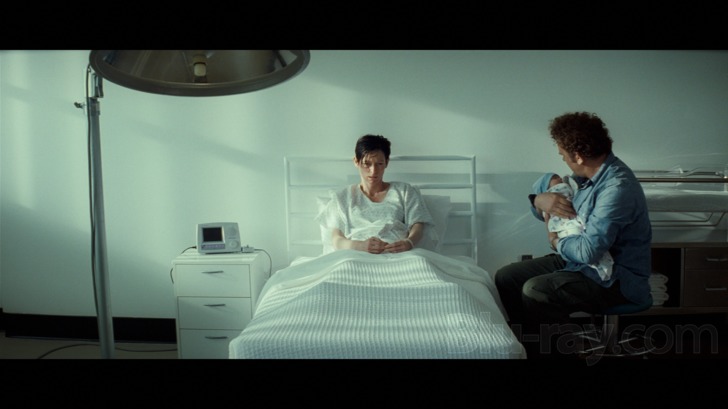
Motherhood
Based on the acclaimed 2003 novel by Lionel Shriver, the movie was written for the screen and directed by Scottish filmmaker Lynne Ramsay, whose previous films, 1999's Ratcatcher and 2002's Morvern Callar, announced her as a major independent film presence. (Track down both if you haven't seen them yet.) Ramsay got sidetracked for years with an unfruitful attempt at adapting Alice Sebold's The Lovely Bones—which later got handed over to Peter Jackson—and she recently told The New York Times that her version would have differed drastically from the book, doing away with the "My Little Pony, she's-in-heaven, everything's-okay aspect." It's fitting, then, that she would choose We Need to Talk About Kevin to be her much-awaited cinematic return—it's a similarly dark story, but instead of comforting us with easy answers, it challenges us to think about the nature of hate, destruction, and what we might uncomfortably call "evil."
Fans of the book may notice that Ramsay has made some significant changes here as well—ditching the novel's epistolatory structure, for one—but the premise is still the same: Tilda Swinton, in a brilliantly complex performance, plays harried mother Eva Katchadourian, whose life is thrown into chaos when her sixteen-year-old son Kevin (Ezra Miller) commits an unfathomable act of violence. Ramsay tells the story non-linearly, jumping before and after "the event" in a way that seems erratic at first, but gradually makes a kind of emotional sense. The heavily stylized time-skipping also helps to strategically reveal and withhold certain pieces of narrative information, effectively maintaining a sense of mystery about the hows and whats and whys.
When the film opens, Eva is living alone in a rundown clapboard house that someone has recently—and angrily—doused with red paint. The scenes of her ineffectively scrubbing and sanding the front porch call to mind Lady Macbeth's "damned spot," and Eva is clearly wracked by a similar guilt. She seems to be subsiding entirely on a diet of red wine and depression meds, and it takes all her mental wherewithal to apply for a filing job at a dingy travel agency. Her new coworkers eye her with suspicion. Outside on the street, an older woman runs up, socks Eva in the face, and screams "I hope you rot in hell!" Whatever happened, it's made Eva the town pariah. She exists in the kind of sunshiny suburban nightmare that wouldn't be out of place in a David Lynch film.
We eventually piece together that Eva is a once-famous travel writer who gave up her wanderlust to start a family with her teddy bear of a husband, Franklin (John C. Reilly). She's not what you might call "mother material," and postpartum depression hits her hard. Her firstborn, Kevin, is so colicky that Eva pushes his carriage by a construction site just so the jackhammering will drown out his wails. As he grows—played at two by Rocky Duer and at six by Jasper Newell—it becomes increasingly obvious that Kevin has an unexplained, unconditional hatred of his mom, even from before he's able to talk. He craps his pants just to get a rise out of her. He destroys her wall-mounted collection of antique maps, a reminder of the life she left to have him. And he's extremely manipulative, mentally toying with Eva and using the fact that she once threw him into a wall, breaking his arm—though he totally had it coming—to make her feel like the world's worst parent. His dead-eyed, soulless stare projects only malice and preternatural arrogance. It's creepy, and we're left to wonder whether nature or nurture is the cause. Is Kevin's behavior a manifestation of his mother's negative emotions over leaving her career? Is he a distant cousin of the grotesque psychosomatic children from Cronenberg's The Brood? Is he evil incarnate?
Whatever he is and whatever he does, no one talks about Kevin in any meaningful way, and this, of course, is the irony of the title. Franklin is totally clueless, dismissing Eva's worries with a friendly shrug: "He's just a boy. He's a sweet little boy. That's what boys do." But Kevin's actions go beyond boys will be boys, especially in his deranged teenaged years. Do boys put their kid sister's guinea pig in the garbage disposal? Do they crack a maniacal Jack Nicholson-in-The Shining-style smile and keep whacking it when their mom walks in on them masturbating? Because that's Kevin does, and it's anything but sweet. The warning signs flash—bright red—but everyone ignores them.
Don't get the idea, however, that this is merely a cautionary tale or tidy message movie about the perils of not communicating. Ramsay isn't so much interested in examining what causes contemporary American kids to snap as she is in exploring deeper questions about motherhood, guilt, and the inherent place of violence and hatred in human existence. To symbolically express this last point, she splashes blood red somewhere in nearly every scene in the film—see Kevin's jelly sandwiches, or Eva's flashback to Buñol Italy's messy tomato festival—and while this may seem over-obvious, the repetition of the color becomes a constant reminder that beneath all our civility we're still animals, capable of killing and being killed. We Need to Talk About Kevin is grimly nihilistic and doesn't shy away from hard truths or uncomfortable taboos, so it's bound to be divisive. If you can handle the subject matter, though, the film will reward you with terrific performances—literally terrifying, at times—and lots of psycho-philosophical gristle to chew.
We Need to Talk About Kevin Blu-ray Movie, Video Quality 
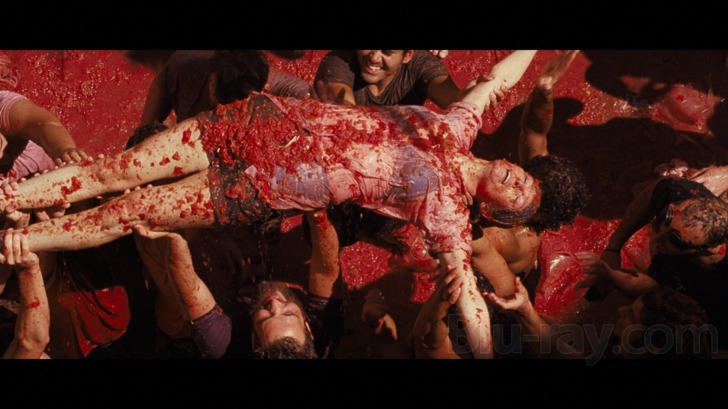
Oscilloscope has given We Need to Talk About Kevin an impressive 1080p/AVC-encoded transfer, framed in the film's original 2.35:1 aspect ratio. The image is untouched by noise reduction, edge enhancement, or excess filtering of any kind, and for good reason--there's absolutely no need for digital alterations. Shot on fine-grained anamorphic 35mm, the print often yields a striking amount of detail—anamorphic lenses are almost always produce a sharper picture than non-anamorphic glass—with closeups revealing extremely fine facial and clothing textures. The film's carefully considered color palette is reproduced perfectly here too; neutral tones are rich and dense, while the cherry-red that's in nearly every shot pops brightly off the screen. Contrast is punchy without looking artificial, and black levels are appropriately dense. There are two or three flashback scenes shot digitally, with a Canon 5D Mark II DSLR and these have a dreamy, almost hyper-real quality. Finally, the encode fits easily on a dual-layer disc; I didn't notice any overt compression-related issues. A fantastic-looking film, all around.
We Need to Talk About Kevin Blu-ray Movie, Audio Quality 
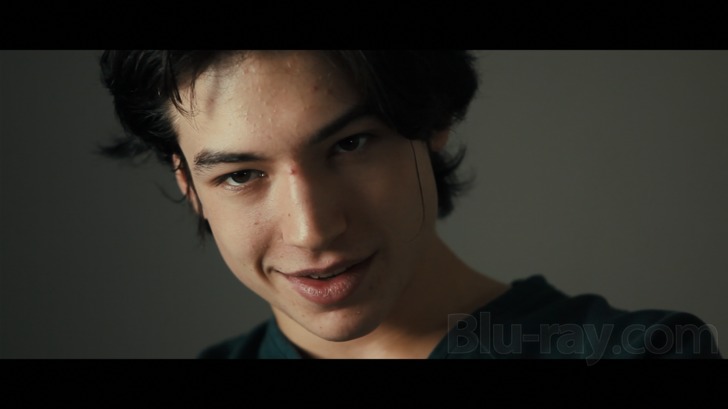
We Need to Talk About Kevin features two audio options, a lossless DTS-HD Master Audio 5.1 surround track and an uncompressed Linear PCM 2.0 stereo fold-down. Both mixes are clear and dynamically robust—big and full and crisp—but if you've got a surround sound system you'll definitely want to stick with the multi-channel offering. Kevin's pervasive mood of hysteria and unsettling family dread owes a lot to its carefully sculpted sound design, which uses disembodied voices and repeated sounds—like the click-click-click-spray of a lawn sprinkler—to illustrate Eva's fractured mental state. Key effects fill or move seamlessly through the rear speakers—from a pounding jackhammer and a chainsaw's roar, to pouring rain, zipping arrows, and running children—while Jonny Greenwood's dark score plinks away atonally. The use of music in the film is fantastic, not just Greenwood's cues—which set an immediately uneasy vibe—but also the numerous oldies pop tunes, like Buddy Holly's "Every Day," which are used in an ironic, contrapuntal way. Dialogue throughout is clean and easily understood, and there are optional English SDH subtitles if you need or want them.
We Need to Talk About Kevin Blu-ray Movie, Special Features and Extras 
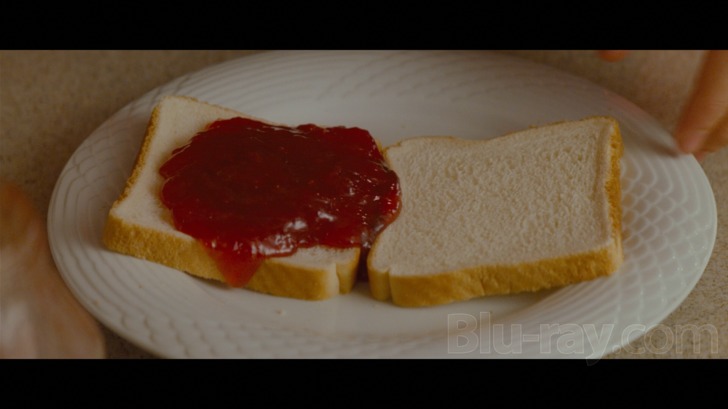
- Behind the Scenes of Kevin (1080p, 27:05): A wonderful series of interviews with the film's cast and crew, covering nearly every aspect of production, from the adaptation process and casting to the very intentional art direction and decision to shoot on anamorphic 35mm. Also, lots of reflections on the film's rather heavy themes.
- Extra Footage from "La Tomatina" Tomato Festival (1080p, 4:15): Raw footage of the "young, globe-rotting Eva" at the tomato festival in Bunol, Spain. Presented without sound.
- In Conversation with Tilda Swinton (1080p, 17:52): A Q&A session with Swinton at the 2011 Telluride Film Festival, moderated by writer/theater critic Hilton Als.
- Interview with Author Lionel Shriver (1080p, 3:58): A short clip of Shriver at the film's London premiere, discussing the writing of the novel and some of the changes that needed to be made for the film adaptation.
- Original Theatrical Trailer (1080p, 1:45)
- Oscilloscope Releases: Includes trailers for Kisses, Exit Through the Gift Shop, Bellflower, and Rebirth.
- Packaging:As usual for Oscilloscope, We Need to Talk About Kevin comes in an attractive fold-out recycled cardboard package-- inside a slipcover--with artwork, photos, and a short essay on the film by psychoanalyst Mark Stafford.
We Need to Talk About Kevin Blu-ray Movie, Overall Score and Recommendation 
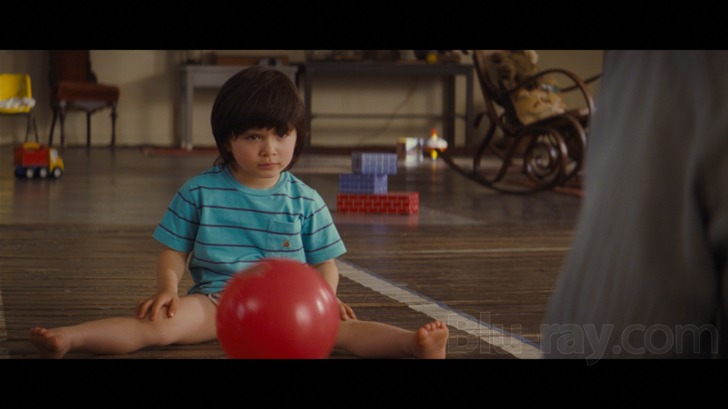
I never got the chance to watch We Need to Talk About Kevin in theaters, but now that I've finally seen it, I feel like I'm forced to reevaluate my top-10 list for 2011. This one's now going to sit quite close to the top. On every level, Kevin is a masterfully made film—the considered set design and art direction, the brilliant acting, the gorgeous cinematography, and of course the story, which is as thought-provoking as it is unnerving. Oscilloscope's Blu-ray release is a thing of beauty too, with a striking high definition transfer, lossless sound, and plenty of extras, all dolled up in a recycled cardboard case. Very highly recommended!
Other editions
We Need to Talk About Kevin: Other Editions
Similar titles
Similar titles you might also like

Moonlight 4K
2016

First Reformed
2017

Marnie 4K
1964

Boyhood
2014

Josie
2017

Antichrist
2009

Repulsion
1965

The Offence
1973

The Banishment
Izgnanie
2007

You Were Never Really Here
2017

Track 29
1988

Maps to the Stars
2014

The Salesman
Forushande
2016

The Night of the Hunter
1955

Beyond the Hills
După dealuri
2012

Martha Marcy May Marlene
2011

M
M - Eine Stadt sucht einen Mörder / German and English Versions
1931

If Beale Street Could Talk
2018

Shadow Dancer
2012

Waves
2019
